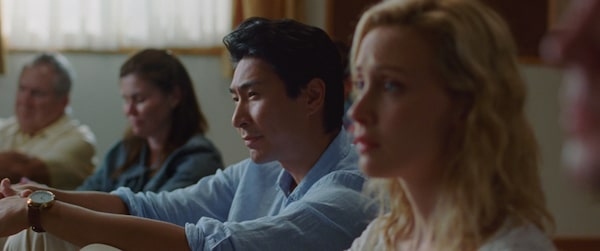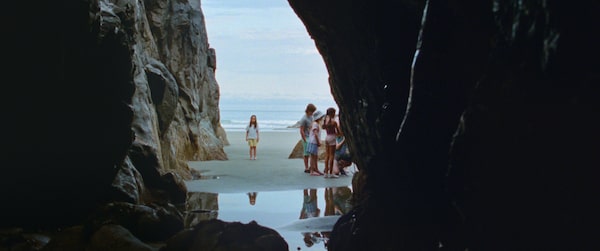
Director Meredith Hama-Brown's first feature film Seagrass deftly tugs at divorce narrative conventions and surveys the ways we curl inward in crisis.Supplied
Seagrass
Written and directed by Meredith Hama-Brown
Starring Ally Maki, Luke Roberts and Sarah Gadon
Classification N/A; 115 minutes
Opens in select theatres Feb. 23
Critic’s Pick
In Canadian filmmaker Meredith Hama-Brown’s impressive feature debut, Seagrass, a couple struggling with their communication and cultural differences attend a retreat on the Pacific coast, where they partake in tense group-therapy sessions while their children roam the lush grounds. By deftly tugging at divorce narrative conventions and the slow erosion of a household, the film surveys the ways we curl inward in crisis.
Judith (Ally Maki), a Japanese-Canadian woman grieving the recent death of her mother, and her husband Steve (Luke Roberts), a white Canadian, take up a roomy cottage with their two children, 11-year-old Stephanie (Nyha Huang Breitkreuz) and six-year-old Emmy (Remy Marthaller). Steve is visibly agitated by Judith’s desire to try public talk therapy, insinuating that her wounds are exaggerated. Judith is processing the fixed lines of racial difference present in her marriage and children.
The retreat gives off the impression of a relationship hospice, where wellness efforts make plain the cavities within these marriages, although some swear by its methodology. Another couple, Pat (Chris Pang) and Carol (Sarah Gadon), are regulars, polishing their marriage with cultish therapy exercises: pummeling a pillow while the group stands by, talking to mirrors held up by one’s partner, staging tableaux vivant to imagine each participant in a casket. The couples coo and nod through the exercises, while a combined thrill and unease seems to wash over Judith, who gets closer to Pat as she finds comfort in his similar experiences growing up Asian Australian.
Too many movies on your to-watch list? Here are the best films of 2023
Meanwhile, the two daughters sense the impending break in their family dynamic and attempt to enjoy their vacation. Stephanie falls in with a group of entitled preteens who consider her racial ambiguity amusing and “exotic,” while Emmy fixates on and cultivates a friendship with a purple beach ball at the public pool, the waxy plastic a compelling token of her insincere surroundings. Like their parents, the girls begin to drift apart, with Stephanie adopting the foibles of her friends and Emmy searching for a more tender version of her sister.
Gossip of a nearby cave that can summon dead spirits contorts this family drama into something of a ghost story. Through numerous eerie interludes, a spinning camera captures dim, liminal scenes of the beach house, its terrace and the cave, the buoying visuals and gunmetal palette suggesting a return of the late matriarch. Where convention may call for a family member’s postmortem “visits” to be warm and insightful – a good omen of being lovingly watched over – one cannot shake the feeling that these sequences are portents of the family’s rift.
The spiritual presence in the film is oblique, guided largely by Emmy’s panicked belief that she accidentally summoned her grandmother after visiting the cave. Hama-Brown’s attention to women, lineage and hand-me-down worry is deeply felt and encourages a reading of the film that moves beyond static notions of generational trauma. There is a sense that understanding one’s identity is an equally corporeal and emotional experience; we see each of the three girls overcome with realization while dancing – Judith at a bar, Stephanie at a house party and Emmy in a particularly affecting moment, where she breaks into tears performing a dance routine to Seasons in the Sun by Terry Jacks, which is, lyrically, a valedictory gesture of a man about to die.

The setting of a cave in some parts of the film changes the film from a more typical family drama into something of a ghost story.Supplied
There are some elements less believable than others. At one point, Judith says, “I think I’ve been programmed not to think of certain things,” though these things are evidently the traumas of racial and cultural difference, those qualities conducive to otherness in the West. The act of truly reckoning with one’s identity can dissolve a marriage like solvent (and it does in the case of Judith and Steve), but how this couple navigated marriage and child rearing while seemingly knowing each other so little is at times difficult to conceive. Maki and Roberts do not appear attuned to any marital rhythms and look at each other with a hostility missing a history, though one may contend this is the nature of breakups.
Over all, Seagrass is a mesmeric debut, aware of its boundaries and able to inject feelings of doom and despondency into even the most hopeful sequences. Hama-Brown’s gaze ambles from corridors to stifled arguments, capturing the nonmaterial as much as the earthly – an assured imagination well worth perusing.